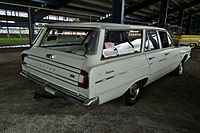Chrysler Valiant (VE)
| Chrysler VE Valiant | |
|---|---|
 Chrysler Valiant sedan | |
| Overview | |
| Manufacturer | Chrysler Australia |
| Also called | Dodge utility[1] |
| Production | October 1967 – February 1969[1] |
| Assembly | Tonsley Park, Australia |
| Body and chassis | |
| Body style | 4-door sedan[1] 5-door station wagon[1] 2-door coupe utility[1] |
| Layout | FR layout[1] |
| Powertrain | |
| Engine | 225 cu in (3.7 L) I6[1] 273 cu in (4.5 L) V8[1] |
| Transmission | 3spd manual[1] 3spd automatic[1] |
| Dimensions | |
| Wheelbase | 108.0 inches (2743 mm) (sedan)[1] |
| Length | 193.7 inches (4920 mm) (sedan)[1] |
| Width | 69.7 inches (1770 mm) (sedan)[1] |
| Height | 55.0 inches (1397 mm) (sedan)[1] |
| Curb weight | 2950 lb (1338 kg) (sedan)[1] |
| Chronology | |
| Predecessor | Chrysler VC Valiant[1] |
| Successor | Chrysler VF Valiant[1] |
The Chrysler VE Valiant is an automobile that was produced in Australia by Chrysler Australia from 1967 to 1969.[1] It was released in October 1967, replacing the Chrysler VC Valiant.[1] The premium model in the range was renamed Valiant VIP due to the V8 engine becoming an option across the entire range.
Model range
[edit]The VE series Valiant was offered in 4-door sedan, 5-door station wagon and 2-door coupe utility models.[1]
- Valiant sedan[2] (VE-M41)
- Valiant Safari wagon[2] (VE-M45)
- Valiant Regal sedan[2] (VE-H41)
- Valiant Regal Safari wagon[2] (VE-H45)
- Valiant VIP sedan[3] (VE-P41)
- Valiant VIP Safari wagon[3] (VE-P45)
- Valiant utility[1] (VE-L20)
- Valiant Wayfarer utility[1] (VE-M20)
VE series Valiant and Valiant Wayfarer utility models were introduced in May 1968.[4]
-
Chrysler VE Valiant sedan
-
Chrysler VE Valiant Safari wagon
-
Chrysler VE Valiant Safari wagon
-
Chrysler VE Valiant Regal sedan
-
Chrysler VE Valiant Regal sedan
-
Chrysler VE Valiant VIP sedan
-
Chrysler VE Valiant VIP sedan
-
Chrysler VE Valiant utility
Dodge utility
[edit]A variant of the Valiant utility was marketed as the Dodge utility.[5] (VE-E20) The Dodge was equipped with painted grille and bumpers[5] unlike the chromed examples fitted to VE Valiants.

Changes
[edit]The VE Valiant was larger than any previous Valiant model.[1] Styling was based on that of the US Dodge Dart and Plymouth Valiant models with no body panels carried over from the VC Valiant. While the styling from the A-pillar back was Australian-influenced, sheeting forward of the A-pillar and bonnet was that of the U.S. Dart/Valiant models with the exception of the grille which was convex on the Australian models as opposed to concave on the U.S. models.[6] Also new in the VE range were dual-line brakes, double-sided safety wheel rims, front safety belts and power-assisted front disc brakes on V8 models.[1] The Valiant VIP (four-door performance model) was offered for the first time,[1] the new model featuring the V8 engine, automatic transmission, power steering, front disc brakes and reclining front seats.[6]
Engines and transmissions
[edit]A 145 bhp 225 cu in (3.7 L) Straight-six, a 160 bhp 225 cu in (3.7 L) "High Performance" Straight-six and a 195 bhp 273 cu in (4.5 L) V8 engine were available, the VE being the first series to be offered with a choice of three engines.[1] Three speed manual and three-speed "Torque-Flite" automatic transmissions were offered.[1] The V8 engine and automatic transmission were standard on the VIP.[3]
Awards
[edit]
The VE Valiant was announced as the winner of the Wheels magazine Car of the Year award in January 1968.[7]
Production and replacement
[edit]A total of 68,688 VE Valiants were built prior to its replacement by the VF Valiant range in March 1969.[1]
See also
[edit]References
[edit]- ^ a b c d e f g h i j k l m n o p q r s t u v w x y z aa ab Elisabeth Tuckey and Ewan Kennedy, Chrysler Valiant, 1996, pages 47 to 57
- ^ a b c d Chrysler Australia sales brochure 5/6001015R for VE series Valiant & Valiant Regal sedans and wagons
- ^ a b c Chrysler Australia sales brochure for VE series Valiant VIP sedans and wagons
- ^ Glass's Dealers Guide, Passenger Vehicle Vales, South Australian and Northedrn Territory Edition, June 1973, page 115
- ^ a b Larry O'Toole, The Good Old Aussie Ute, 2000, page 199
- ^ a b Tony Davis, Aussie Cars, 1987, page 101
- ^ Gavin Farmer, Great Ideas in Motion, 2010, page 138









